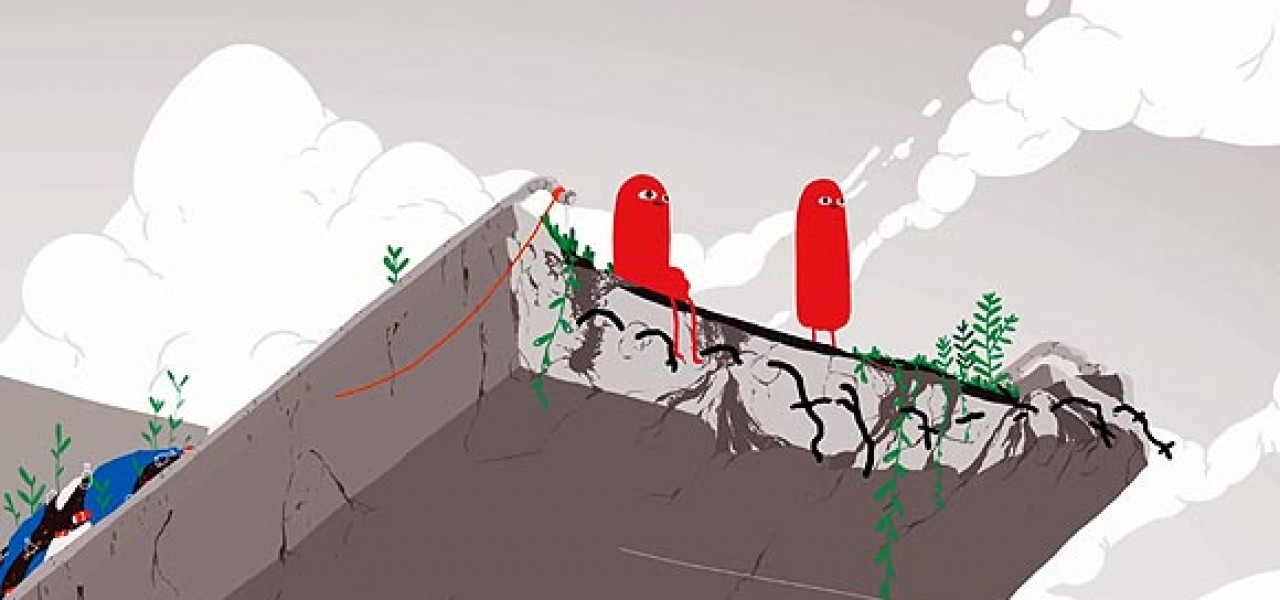
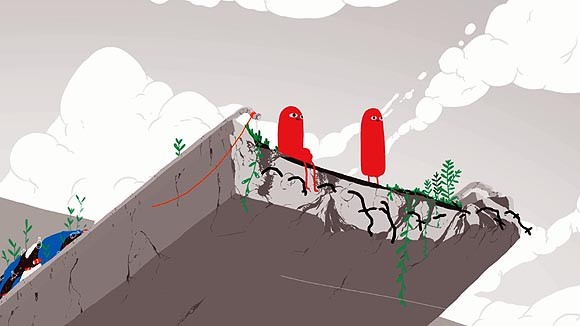
Late Night Work Club Premieres 38-Minute Compilation “Ghost Stories”
Today, the Late Night Work Club debuts their first project Ghost Stories, a 38-minute compilation of animated shorts by up-and-coming names in the animation world. The films and filmmakers are:
I Will Miss You by Dave Prosser
The Jump by Charles Huettner
The American Dream by Sean Buckelew
Mountain Ash by Jake Armstrong and Erin Kilkenny
Rat Trap by Caleb Wood
Loose Ends by Louise Bagnall
Phantom Limb by Alex Grigg
Asshole by Conor Finnegan
Ombilda by Ciaran Duffy
Post Personal by Eamonn O’Neill
Last Lives by Scott Benson
At a time when more animated shorts are being produced than ever before, it is increasingly difficult to get attention for individual short films. Late Night Work Club’s attempt to create a curated ‘mix-tape’ of animated shorts is an interesting attempt to draw more eyeballs to the work of independent filmmakers.
The project is ambitious in both scope and length, particularly considering that it was made with no commercial intent. The filmmakers self-funded the entire project with no crowdfunding or other forms of sponsorship. The filmmakers hope to recoup some of their costs by offering download packs and Uncanny Mystery Packs. Also unique, the film wasn’t kept offline for a festival run. It debuts on Vimeo today, just five days after its theatrical premiere in Los Angeles.
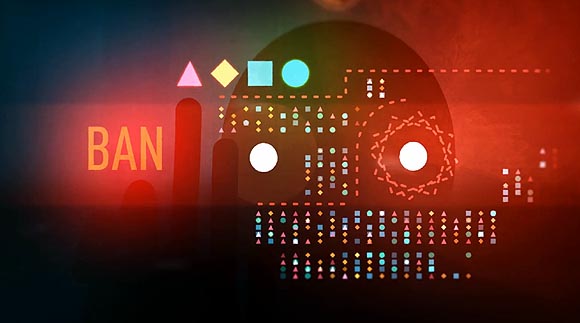
I interviewed filmmaker Scott Benson, one of Late Night Work Club’s founders, to find out more about LNWc and the unique creative and distribution strategies that they are exploring with Ghost Stories.
Cartoon Brew: Late Night Work Club began in 2012 as a collective for animation filmmakers who wanted to create non-commercial work. These type of collectives have existed before in one fashion or another, but most do not choose to release a single project around a specific theme, such as ghost stories. What made you decide to pursue this route?
Scott Benson: The themed anthology thing was a pretty direct inspiration from NoBrow I think. The general ideas for what would become Late Night Work Club had been kicking around between Charles Huettner, Eimhin McNamara, Eamonn O’Neil and I on Twitter for a few months. I was reading an issue of NoBrow at one point and was thinking, “The comics in here are like the animation I like and my friends make. Why isn’t there a place for us like this?” Something that wasn’t self-consciously highbrow or lowbrow, just a bunch of creators with strong individual voices all doing variations on a theme. That kind of thing appealed to me, and then we talked about it and the idea grew.
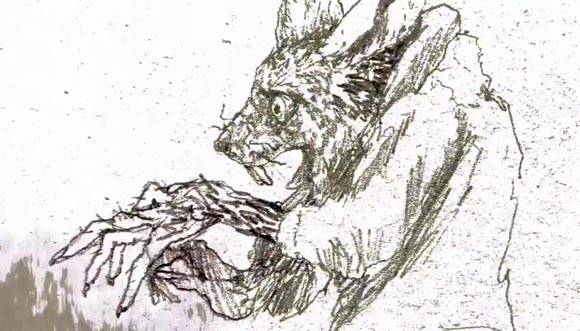
Cartoon Brew: How does creating a 38-minute film as opposed to a more standard short-film length increase your opportunities for visibility? Do you feel there are any downsides to this approach than if everyone had just released their films individually?
Scott Benson: Not sure, honestly. We’re making this up as we go. We didn’t want it to feel like a film festival, but more like a compilation. One album, a bunch of different bands. Go through, find someone whose work you love and seek them out individually. If we released them all separately there’d be one or two films that would get a lot of buzz here or there, and a lot of the others that might not have been picked up on this or that blog would get passed over. Doing it together binds us all into one noncompeting group. We all rise or fall together. We’re all colleagues and a lot of new friendships have developed over this project, and so it makes sense to do this all together. It’s one group project with a lot of defined voices, and that’s pretty cool. I do personally hope that doing it this way also makes it more of an event as opposed to just a curated list of affiliated shorts. We’ll see how it goes.
Cartoon Brew: I was surprised to see that you didn’t run a crowdfunding campaign. How did you convince nearly a dozen artists to create projects on a specific schedule with no financial incentive?
Scott Benson: No one needed any convincing. It was just “Hey you! You want to join up?” Never anything beyond that. Everyone immediately got it, and many seemed eager for something like this to come along (including me). We never got any outright refusals to our invites, just a few people who had to drop out because of life or couldn’t join this time but wanted in on the next one. No one even said the word Kickstarter, it just wasn’t a thought. Maybe in the future, who knows. We’d want to do this anyway, so we just did it. And hey, there is indeed a financial incentive—if we make enough from donations and sales of downloads/ mystery packs, we’ll have enough to split up fourteen ways and then we can each buy a pizza and have an international pizza party over Google Hangout.

Cartoon Brew: How much interaction was there between the collective? For example, does everybody have to pitch their idea to the group and get it approved? Or were there limits on lengths, style, content?
Scott Benson: There was a rule from the beginning that each member set their own level of involvement. If they wanted to just make their short in peace with minimal chatter, that was fine. If they wanted to get all involved with each other or the project in a broader sense, that was cool too. There are some epic-length email chains as we looked at one another’s work, gave reactions and encouragement, or just chatted about the project or our lives or whatever. There was also some cross-short help. I did the snow in the first shot of Alex [Grigg]’s short, and he made some Photoshop brushes that I know several of us used. There were a couple of times where we all delivered our general ideas, mostly to make sure they didn’t sound like total crap to other people. The suggested length was ~2 minutes or longer. Other than that we didn’t really have a lot of guidelines and for the most part there were no discussions about content. In part that was because the group was a bunch of adults who wanted to make something personal or fun, or to stretch creatively, so with very few exceptions the content discussion didn’t need to come up. We weren’t trying to be all, “Look how ka-razy this R-rated animation is! These ain’t your DAD’S cartoons!” That kind of thing is so tired, silly and small. We just made what we liked.
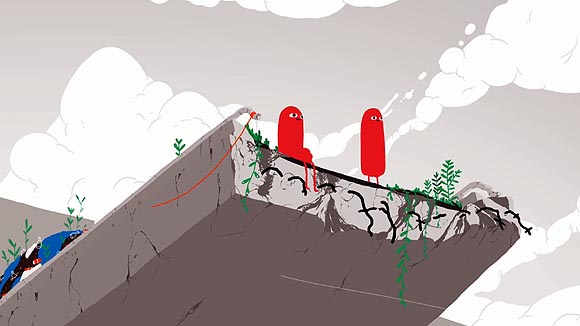
Cartoon Brew: I guess one reason I wondered about that is that nearly all the shorts that were in color used a no-outline style which is a trendy look nowadays in digital animation. Was that a conscious aesthetic choice or coincidental?
Scott Benson: Stylewise, everyone also just did what they wanted to do. Much of it follows on from the styles of the work we did before Late Night Work Club. If you watch the first three shorts, for example, those are three distinct voices whose work very much flows from what they do elsewhere. My short is almost embarrassingly within my wheelhouse, I think. If there are similarities, it’s just how we roll individually, and we each got there in our own way on the road to wherever we’ll be artistically in the future. And if that’s trendy, maybe we’ll all finally have dates to the prom this year. Fingers crossed.

Cartoon Brew: Another unconventional part of this is your distribution plan in which you’re premiering the film online before a festival run. What is your release strategy and what do you hope to accomplish with it?
Scott Benson: As much as we’d love to, both Charles Huettner and I have never been able to attend a festival, though our work has played at them. We both live in Pennsylvania and probably make up about 50% of the people in that state making their own animated work. A lot of other LNWC members are out there at Annecy, Ottawa, Pictoplasma, etc. every year and they’re like, “I just watched some really cool thing after the two-hour program on sand animation or whatever, but you’ll have to wait until it goes online.” And the years go by, and I’m still waiting to see a lot of things I got super excited about when I saw the trailer years back. Now imagine you’re a teen. Those years are forever. Animation will never be as diverse, as interesting or as inspiring as it can be if the best work is only available for years at a time on specific weekends in faraway cities, accessible mostly to people with the means and ability to fly there, book hotels, and pay for passes.
Having it up on the Internet from day one was set in stone for us right from the start. We’d love to do fests and will be at them over the next year if they are good enough to have us, but our audience are the people with an Internet connection, but no ready access to the very tiny world of animation film fests. I’m one of them. Most people are. And getting this in front of them will expose them to our work and hopefully inspire others to say, “I can make things. I can say things. I want to get into this. I want to support this scene.” And that is something I feel really good about. Personally, I want people other than fellow animators and hardcore fans to see my work, longshot though that is. And a lot of the festival crowd already follows animation news, so there’s an excellent chance they’ll see it online anyway.
Cartoon Brew: What does Late Night Work Club plan to do next, and if anything, will it be the same crew of filmmakers?
Scott Benson: We’ll all probably sleep for a while. Ghost Stories will be screened in various places throughout the fall and hopefully we’ll do some fests with it for the next year or so. There are already plans and conversations happening about the next thing we’ll do together. For our big projects the idea right now is that all participants from the last one have right of first refusal. But as we’re all busy and living our lives, there will be spaces open, and we already have a pretty nice looking list of other potential members. So we’ll see. Like I said, we’re making this up as we go along. But that’s pretty exciting in and of itself.

.png)